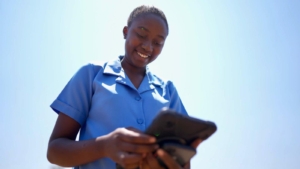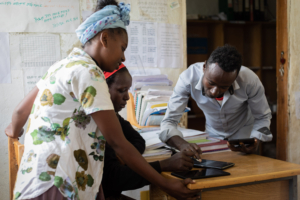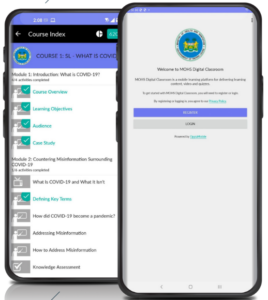For community health workers and their patients in remote communities, digital health systems are vital. Digital patient records help community health workers track when a child should receive his next malaria vaccine or a mother should have her next antenatal check-up. Digital training helps decrease costs—and ensures community health workers can refresh their skills at any time or share videos and information with patients. And digital information systems provide a vital link to the formal health system, allowing district- and national-level health leaders to leverage community-level data and identify emerging disease threats, track health trends, and understand and improve the impact of community health worker programs.
In partnership with ministries of health, Last Mile Health has developed innovative digital health tools that enhance training, streamline record keeping, and connect health leaders to community-level data—equipping community health workers to provide quality care to patients at the last mile. From Ethiopia, Malawi, and Sierra Leone, here are three digital health interventions changing outlooks and outcomes in rural and remote communities.
Ethiopia: An app that keeps community health workers’ knowledge fresh—even offline
In Ethiopia, blended training that uses digital tools has boosted community health workers’ learning—and cut costs by nearly 40%. Together, the Ministry of Health and Last Mile Health launched an app called Extension Essentials to digitize refresher training, improve the quality of learning resources, and provide interactive content community health workers can access anytime, including offline and in remote settings. Strong results from Last Mile Health’s pilot modules have led the Ministry of Health to adopt the blended learning approach formally, with Extension Essentials as its platform. It is now being scaled to a community health workforce of more than 40,000.
Malawi: A community-based information system integrates care and leverages data
In Malawi, Last Mile Health worked alongside the Ministry of Health and partners to develop and launch the integrated Community Health Information System (iCHIS) to manage and aggregate data collected by community health workers. It facilitates a cohesive and integrated approach to extending quality healthcare in Malawi’s rural and remote communities—streamlining record-keeping, equipping community health workers to make decisions at the point of care, and providing community-level data for health leaders to analyze and leverage in tracking disease outbreaks, health trends, and program impact.
Sierra Leone: A digital classroom equips community health workers with essential skills
In Sierra Leone, Last Mile Health and the Ministry of Health piloted an offline mobile application, the MOHS Digital Classroom, to train and equip the community health workforce with essential knowledge and skills. The app provides real-time access to continuous education and capacity-building courses, supports digital self-directed learning and training, and provides data analytics for performance monitoring. Together, its features promote health systems strengthening by enhancing the quality of training for frontline health workers, streamlining training, and providing valuable insights into learners’ experiences.







